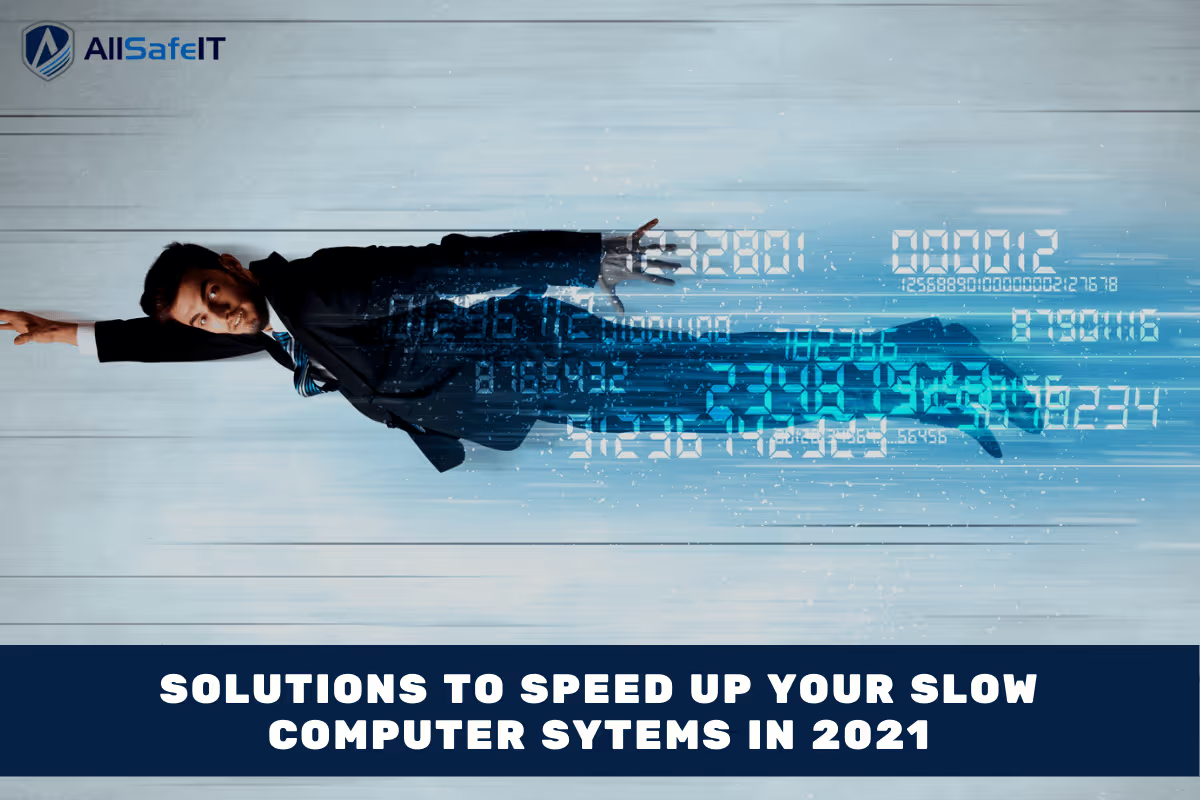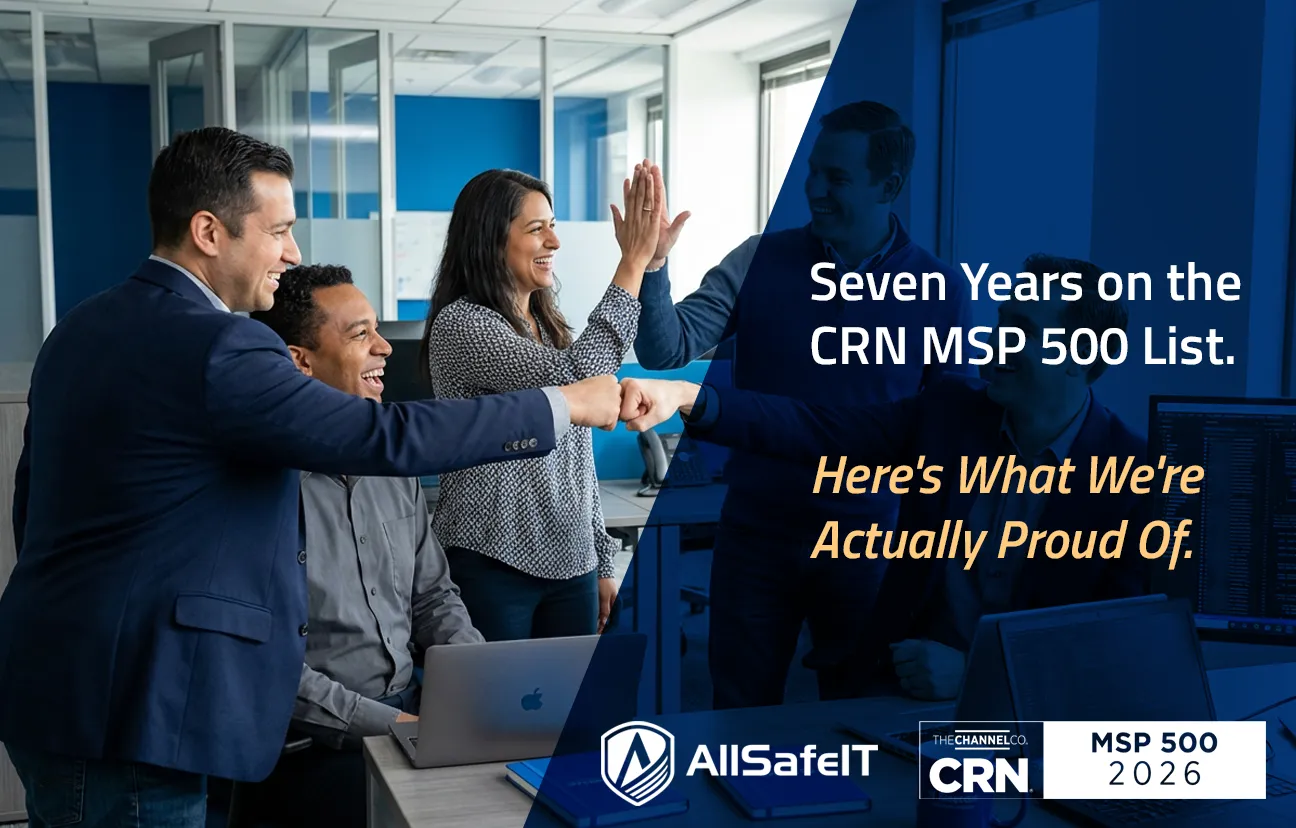10 Solutions to Speed Up your Slow Computer Systems in 2023

We’ve all heard the old adage that “time is money.” And this is especially true in the business world. In today’s business climate, with technology making everything available at one’s fingertips, things move at a much faster pace. As a result, a slow computer can be a huge issue for employees if it causes them to miss urgent deadlines and fall behind in productivity. The ripple effect of this can affect an entire company, forcing them to pay workers for extended hours with less resulting work product, potentially losing dissatisfied customers, and ultimately impacting the company’s bottom line.
If you have had the misfortune of dealing with a slow computer, you are well aware of how frustrating it can be. Whether the slowdown occurs at startup, when trying to browse the Internet or use web apps, or when attempting to work with specific applications, slow and unresponsive computers are a pain to work with.
Luckily, we are here to help! First, we’ll provide some insight and reasons why your computer may not be performing as fast as it could be. Then we’ll share our five best tips on how to fix the issues that are causing the slowdown. Keep reading.

Reasons Your Computer Is Slow:
Before diving into some of the things that you can do to speed up your PC, it is important to be aware of some of the common reasons why your computer might be slow. The biggest mistake that people make which in turn leaves them worrying about their computer slowing down is not shutting down the computer properly. When you put the laptop or computer to sleep rather than switching it off, it does not flush out the programs from the memory of the computer. Rather, it temporarily pauses the computer. This can take a toll on the RAM and lead to your computer to slowing down.
Another common reason that might answer the question, “what is slowing my computer down?” is the installation of too many programs or applications on your computer. Applications and programs take up space in the memory and thus often end up slowing down the computer’s processor. This causes lags causing your computer to delay even when performing the simplest of tasks.
Installing heavier programs like games and video and image editing software can also take up too much space on the computer and end up slowing down the computer. If you have to use such programs, it is recommended that you consider upgrading the computer memory so that your computer is prepared to handle the load of such programs without slowing down.
Lastly, more often than not, your computer might be slowing down because of malware. Malware runs in the background undetected. it can silently exhaust the computer’s resources and end up causing overall lag and delays.
Related Article : Managed IT Services Los Angeles
How To Make Computer Faster?
Here are some tried and tested effective tips that will help you solve this issue ultimately improving CPU performance.
1. Limit Programs That Launch At Startup:
You might have noticed that some programs are launched as soon as you switch your computer on. These are the programs that the computer automatically launches at startup. Some of these programs are the programs that are actually needed, but there are plenty of others that are useless.
The programs that are automatically launched start running in the background and thus take up the CPU resources. Applications that you are not even using end up exhausting your system ultimately these programs are slowing down your PC.
Go to your computer’s settings and change them to adjust the programs that are launched at startup. To do so:
- Open your task manager. You can do so by going to Settings, opening Apps and then clicking the Startup Tab.
- You will see a list of programs with a toggle option that allows users to disable or enable the programs that will be launched at startup.
- Go through this list and only enable the programs that you require immediately after starting your computer and disable the rest. This will boost your computer’s speed and you will notice a significant difference in its performance.
2. Uninstall Unnecessary Programs:
We often find ourselves downloading too many apps and programs on our computers. We may think we might need or will use them, but 9/10 times that is not the case. These apps and programs take up space on our computers and occupy memory. This in turn leads to complaints about our windows 10 running slow.
If you want to effectively speed up your computer, go through the list of the apps and programs that you have installed on your computer and only keep the ones that are absolutely essential and necessary. To do so, you can follow these steps:
- Click the start button.
- Go to the settings of your computer.
- Go to the Apps tab and click it.
- You will see a list of all the programs and applications that are installed on your computer.
- Browse to the program that you wish to uninstall, click on it and then press the uninstall button.
- The app that you selected will be removed from your system.
- Now you can go ahead and repeat the same process for the other applications that you wish to remove.
3. Perform Windows Disk Cleanup:
If you are unsure about which programs and applications are contributing to slowing down your system, you should perform the windows disk cleanup. It is an automatic disk cleanup strategy. Windows runs the disk cleaner which automatically detects the files and programs that have not been used in a while. Then it will ask for the user’s permission and if granted, the files detected will be removed from the system.
Some people are intimidated by the automatic disk cleanup process because they think it will remove files without asking them first. But in reality, the users are shown the list of the detected programs as well as the space that the program has occupied. Then you can choose the programs that you wish to remove and keep the ones that are essential.
4. Consider Upgrading The Memory:
One of the major reasons that contribute to the slowing down of any computer system is too much pressure on memory. If you only have the programs and applications that are absolutely necessary installed on your system, you should consider upgrading your computer memory.
Some people think that they can upgrade their computer’s memory only by changing their laptops or computers. But in reality, you can easily get the memory upgraded while keeping the same machine.
Upgrading the memory is a great choice for people like programmers, video and image editors, and gamers. These programs and applications are generally heavier than common applications and require more space and may end up taking a toll on your computer’s memory and leading to a slow computer. You should either invest in computers that are specifically developed for these tasks or upgrade the memory of your current computer to fulfill these needs.
5. Scan Your Computer For Malware:
At times we can be careless about the safety and security of our computers. This oversight can leave our computers prone to malware and unauthorized hacking attempts. Lagging can be a simple indicator of this type of breach.
If you are sick of a slow laptop and are wondering about how to improve computer performance, you should run a complete scan of your laptop to be certain that your laptop is free from any sort of malware. Make sure that you have an anti-virus installed on your computer and that you run scans on a regular basis. Moreover, avoid downloading fishy email attachments or browsing websites and internet channels that are not secure. The use of a VPN is also recommended as it will protect your online identity and conceal your online presence thus providing a secure fortress around your computer and reducing the risk of a malware attack.
In Conclusion
We hope this article has given you the tools necessary to identify the reason why your system may be running slow. Most importantly, you now have the general know-how and the tools to care for your system. Remember, you do not need to feel frustrated with constant lags and delays, your computer should serve to increase your productivity and relieve headaches not cause them.




